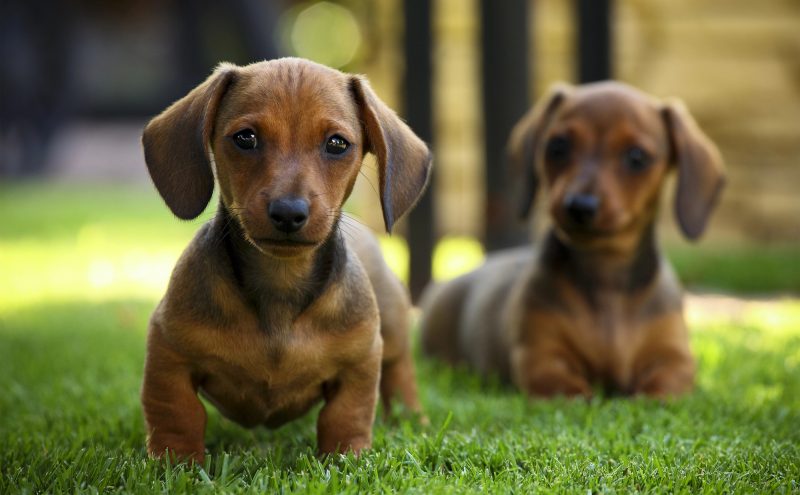
Most dog people know by now that the first clone of a dog was created from the ear-skin cells of a three year old Afghan Hound named, “Tai.” It took nearly 2,000 eggs to make 1,095 embryos implanted in 123 surrogate mothers, all of which produced just three pregnancies. One fetus miscarried, and two live puppies were born by caesarean section after 60 days, one of which died of pneumonia. The surviving Afghan Hound puppy was named “Snuppy,” an amalgam of the institution where he was created – Seoul National University Puppy. In 2015, Snuppy celebrated his 10th birthday, but he died of cancer just 13 days later.
Perhaps not as many people know that in 2014, the first British dog to be successfully cloned was a Dachshund named “Winnie.” Scientists from the South Korean tech firm, Sooam Biotech, took a skin sample from “Winnie,” a 12-year-old Dachshund, after her owner, Rebecca Smith, had won a competition organized by the tech firm (see the two dogs side by side here).
Eggs from a donor dog, also a Dachshund, were used in the process which involved putting Winnie’s cells into the donated eggs to create a cloned embryo. The cloned embryo was then implanted into a surrogate “mother” dog, and Mini Winnie was born in March of 2014 weighing one pound. While Rebecca was in attendance at the birth, she had to wait for Mini Winnie to clear five months in quarantine in South Korea before being flown to Britain and her new home.
Mini Winnie was not the first animal cloned in the UK. That distinction went to a sheep named “Dolly” who was “created” in the Edinburgh University back in 1996. Then – and even now – there is debate over the ethical considerations surrounding animal cloning. What some see as a remarkable achievement in genetic technology, others view as morally vague. Some raise concerns about the well-being and quality of life of cloned animals, others wonder about the impact of cloning on the population of unwanted animals (though given that it cost approximately £60,000, or roughly $76,000 USD, to clone Winnie, we doubt there will be a huge number of people who can afford the procedure). That said, an abstract appearing in 2022 in nature.com reports that over 1500 dogs representing approximately 20% of the American Kennel Club’s recognized breeds have been cloned. The authors add that dog cloning remains comparatively difficult because of a lack of in vitro oocyte maturation methods and “other reproductive complexities.”
In another article, this one by Sara Su and appearing in 2021 in the Aggie Transcript, the author concurs that there are a few species-specific reasons why dog cloning remains inefficient, but ends with the conclusion that there is great potential for the common use of canine cloning since multiple obstacles have been recognized and overcome. We leave it to readers to dig into both articles which are well worth reading.
Whatever the cost or difficulties, they haven’t stopped some from pursuing cloning as a mean to duplicate a beloved dog.
👥 Barbra Streisand cloned her 14-year-old Coton du Tulear, Samantha;
👥 According to according to Reuters and the New York Times, Argentine president Javier Milei’s five English Mastiffs are clones of his now-deceased dog, Conan;
👥 According to Wikipedia (yes, we know), the same company that cloned Mini Winnie cloned two Yakutian Laikas, one cloned from the cells of a dog that had died 12 days before. It adds that the company reportedly charged $100,000 for each cloned puppy;
👥 The Telegraph reported that a Beagle named “Apple,” served as the genetic source for the gene-edited dog, “Longlong,” owned by a Beijing-based biotech company called Sinogene;
👥 In 2015, Junichi Fukuda cloned his black Pug, Momotan;
👥 Various sources including Metro. Yahoo News and The Sun reported that in 2018, Simon Cowell reportedly spent £180,000 to clone his Yorkshire Terriers, “Squiddly,” “Diddly,” and “Freddy;”
👥 In 2009, Sooam Labs cloned “Trakr,” a search-and-rescue German Shepherd Dog said to have pulled the last survivor out of the wreckage from the 9/11 attack in New York.
No doubt there are more “famously owned” cloned dogs, but we conclude with the question: Just because we can, should we?
Though Winnie’s owner said that Mini Winnie looked exactly like the original Winnie did as a puppy, expectations that a cloned puppy will be like their original version in every way are unrealistic. As we all know, personalities are shaped by unique experiences, and it’s extremely unlikely that cloned dogs will have the temperament or character of their donor.
Image: Dachshunds by GORLOV/Depositphoto
